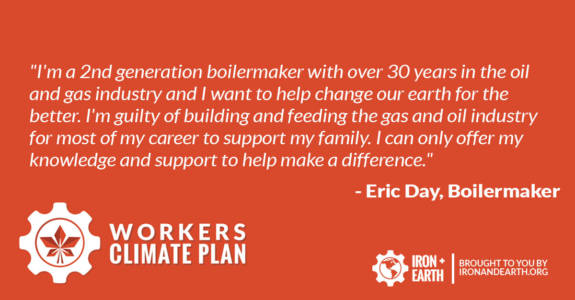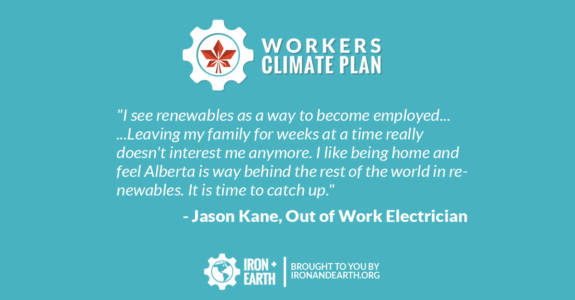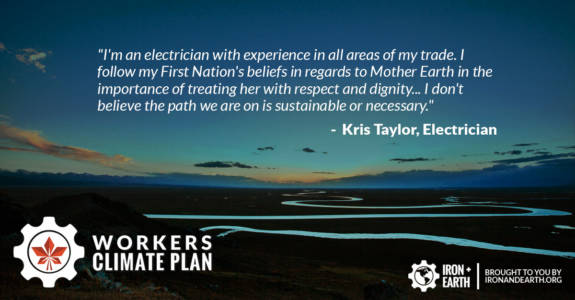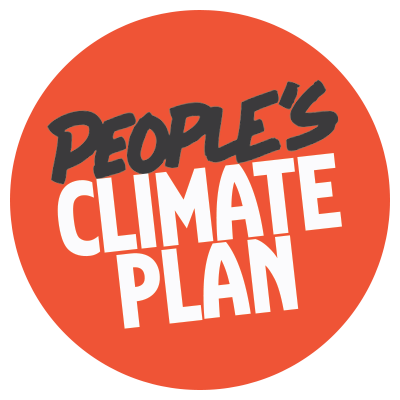The last few years have seen increasingly bitter arguments over large-scale resource projects in Canada. While debate is necessary, it doesn’t have to divide and polarize our country. As we look ahead, one thing is certain…
Canada needs to come together around a national climate strategy that unites people and drives growth in a new energy economy.
Many oil sands workers like myself are concerned about the environmental impact of fossil fuel development — but we’re also concerned about the jobs lost by not building these projects. We face a difficult situation, and don’t want to be yet another example of a Canadian workforce which failed to proactively adapt to a changing world.
That challenge inspired us, a group of oil sands workers, to establish Iron and Earth. We want our voices heard in this debate. We want good-paying jobs that will allow us to care for our families. But we also want to feel pride in the work we do, and to know that our daily actions aren’t contributing to a climate crisis that could dramatically alter the world our children inherit.
That’s why Iron and Earth has launched the Workers Climate Plan, a step toward finding common ground and preparing our country for the future.
Whether we build new pipelines or not, our industry faces increasing uncertainty. A report by Policy Horizons Canada, a government think-tank that provides advice to federal bureaucrats, describes the plummeting cost of renewable energy. It concludes that “it is increasingly plausible to foresee a future in which cheap renewable electricity becomes the world’s primary power source and fossil fuels are relegated to a minority status.”
As we face mounting job losses in the oil and gas sector — with 40,000 lost in 2015 alone — and uncertain international markets, it’s prudent to invest in the future by training existing industrial trades workers to capitalize on this global shift.


Share the #workersclimateplan
That’s why oil sands electrician Chris Brown came out to a recent climate change town hall in Calgary.
Chris doesn’t see an inherent contradiction between working in the oil sands and caring about the environment. Rather, he sees opportunities for oil workers, environmentalists and every day Canadians to get together and develop practical solutions to combat climate change.
At the town hall in June, he explained how he’ll only need brief training to transition over into renewables — maybe just a week or two course to learn the specifics of solar installation. He sees himself and fellow trades people as being best suited to bridge the gap between committed environmentalists and those invested in carbon-based energy — because they’re also committed environmentalists, it’s just their jobs that are currently dependent on carbon-based energy.
@IRONandEARTH and #oilsands worker Chris: environmentalist oilsands worker is not an oxymoron #CANClimateAction pic.twitter.com/AmNn1pFk5U
— Matt Hammer (@VerdantMatt) June 30, 2016
Right now our brothers and sisters in the traditional energy sector are dealing with some of the greatest struggles they’ll face in their entire careers. Putting food on the table and providing stability for oneself or family shouldn’t be a challenge so many face today, but the reality affects more and more people every day.
That’s one of our driving motivations behind launching the Workers’ Climate Plan. We want to see workers and families thrive. We want the green energy revolution to bring us closer to financial security and our climate targets — all at the same time.
And that’s why we so badly need expert input on what the hurdles are to transitioning into renewables. We need a national climate strategy that provides prosperity and stability for workers — one that’s informed by traditional energy workers on the ground so no one’s left behind in transition.
Your participation is crucial.
Share the #WorkersClimatePlan with your friends, family and colleagues. It will help inform real solutions to combat climate change, and it will help us find ways to get people back to work. http://www.workersclimateplan.ca/

